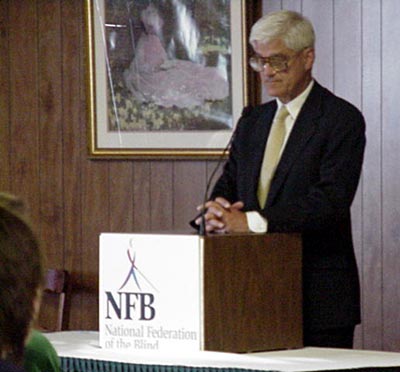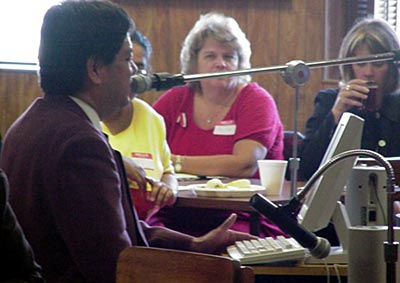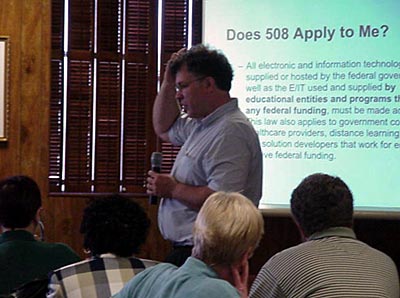
| December, 2002 |
|
Educating the Educators
"What the blind want is text. Text is what our technology looks for," Curtis Chong told an audience of educators, administrators, and designers from around Maryland. The audience convened at the National Federation of the Blind Headquarters in Baltimore on September 10th to attend the joint sponsored NFB and Maryland Technology Assistance Program conference on Education and Information Technology Access.
The conference, designed specifically to address issues of accessibility in the education setting, including web accessibility, software, distance learning, procurement accessibility policies, and Federal and Maryland law, aimed to teach educators and administrators the basics of what accessibility is and why it is necessary.
Bill Paul, a presidential appointee to the United States Access Board, which oversees access by the disabled to buildings, transportation and electronics and information technology, opened the day-long conference with his keynote speech, emphasizing information technology equality for individuals with disabilities.
 D.
D.
Bill Paul addresses the conference attendees.
Curtis Chong, Director of Technology at the NFB, gave an informative and at times humorous demonstration of a blind user's accessibility issues when using a screen reader to surf the Internet. He was able to bring light to many issues such as the use of frames and tables on websites, as well as pointing out simple steps designers can take to make sites accessible, such as adding alternative text tags to all images.
 D.
D.
Curtis Chong demonstrates the trials and tribulations of using a screen reader to navigate through the Web when many websites are designed inaccessibly.
Other presentations focused on federal and Maryland law, procurement, accessible educational software, and writing accessible websites.
Kevin Hunter, senior planner and designer for Widget Works Inc., who gave
the presentation on writing accessible websites, noted that one way to
check a website for accessibility is to:
 D.
D.
Kevin Hunter helps the audience determine whom, exactly, Section 508 applies to.
It was stressed, not only by the presenters, but also by the audience's desire to be there, that by not complying with Section 508 and understanding the needs of accessibility, schools, educators, and designers are denying themselves one of the largest un-tapped audiences in the United States. And even more so, they are denying a significant group of people the fundamental right to enjoy, access, and learn from technology, just as all others are able to do.
*If you would like to learn more about Section 508 and web accessibility, please visit the Maryland Technology Website at
www.mdtap.org/dbtac.html
![]()
